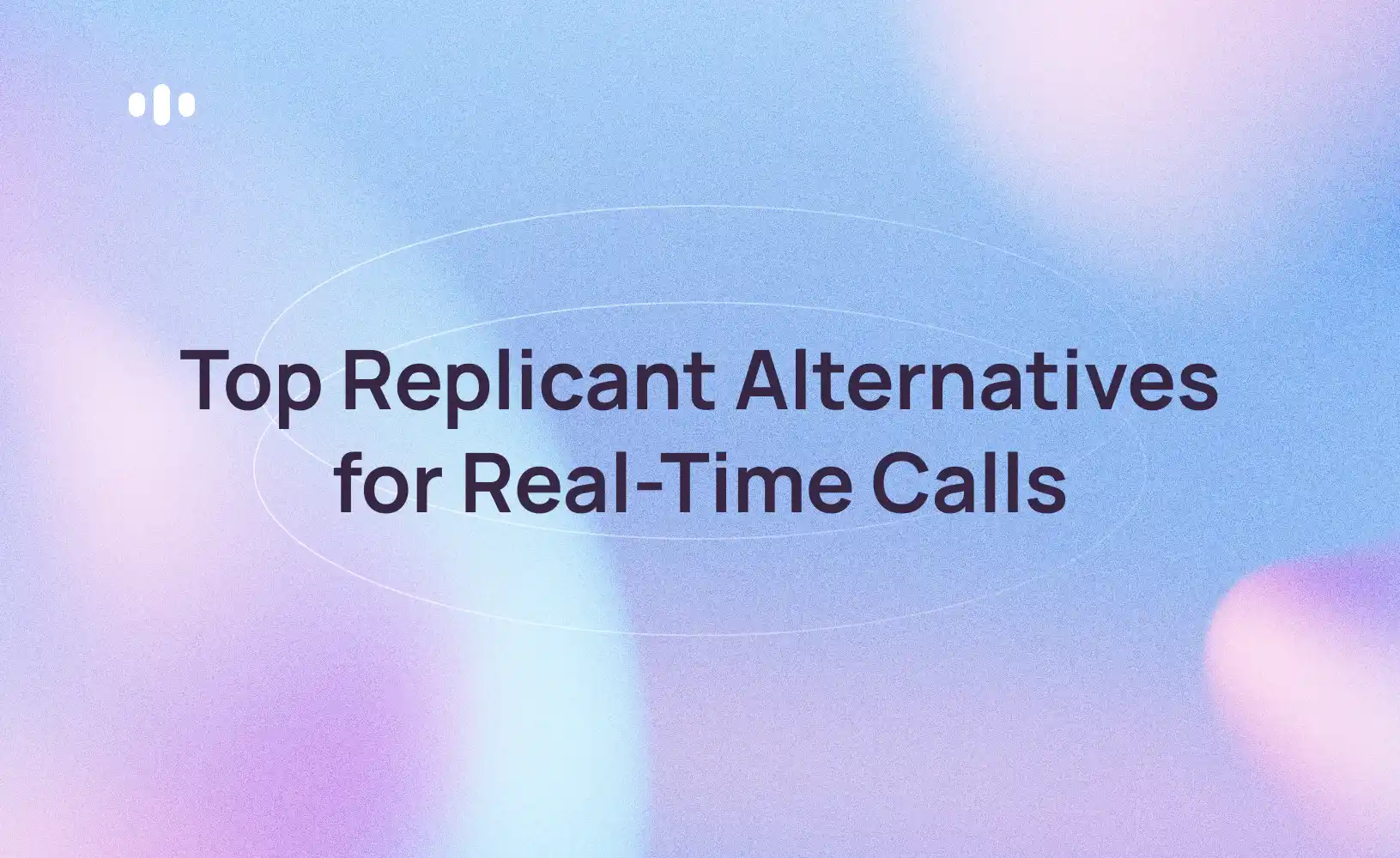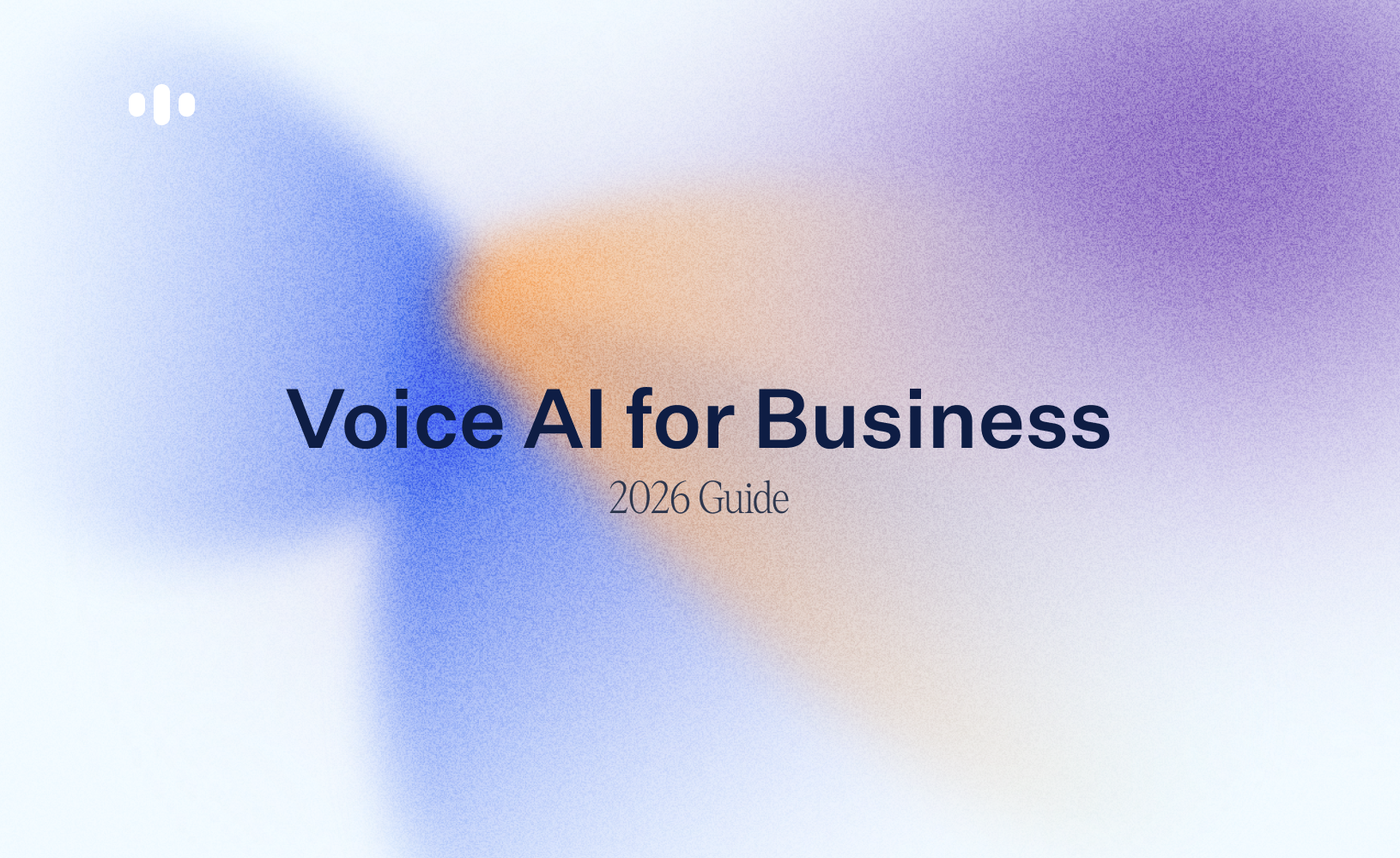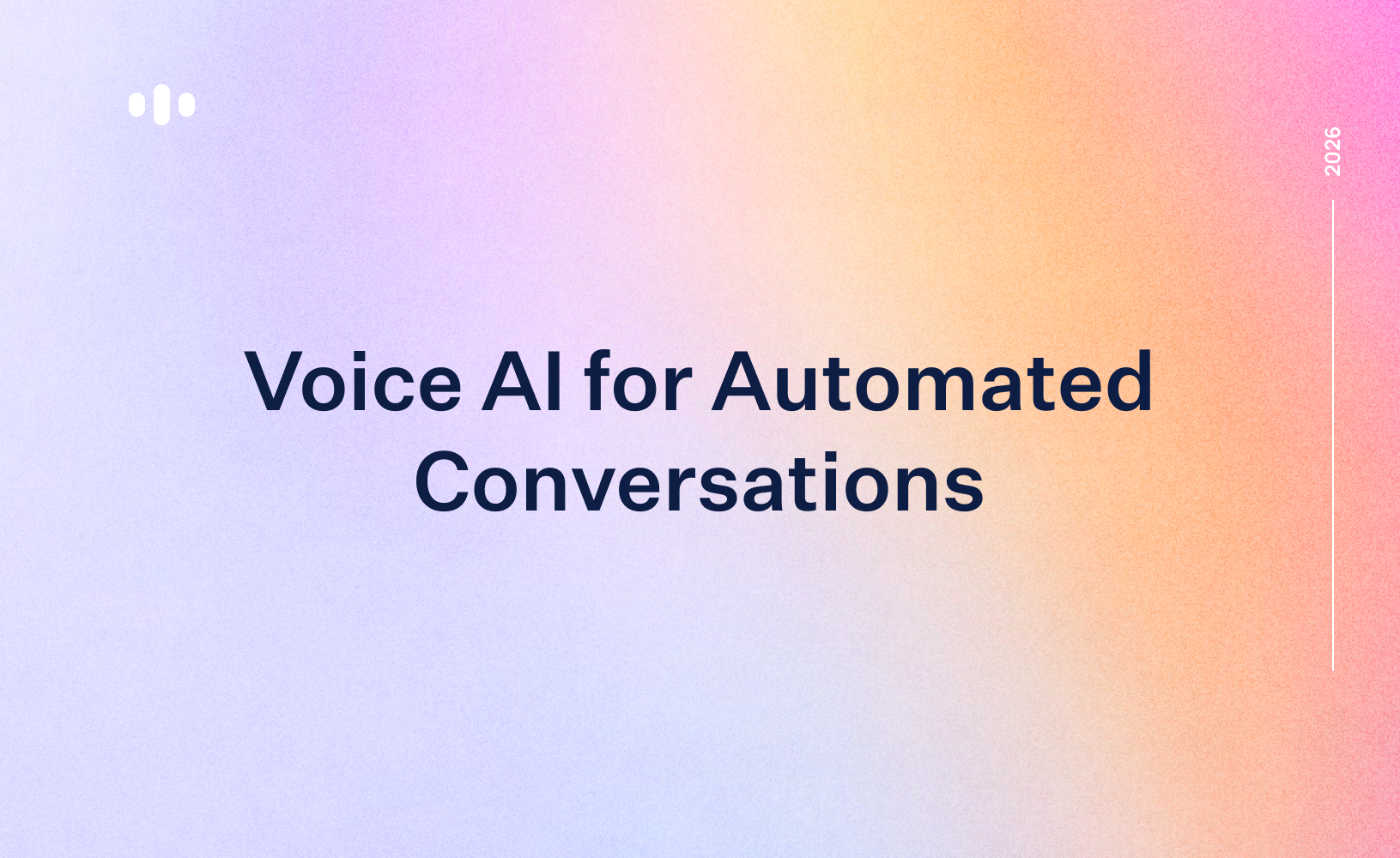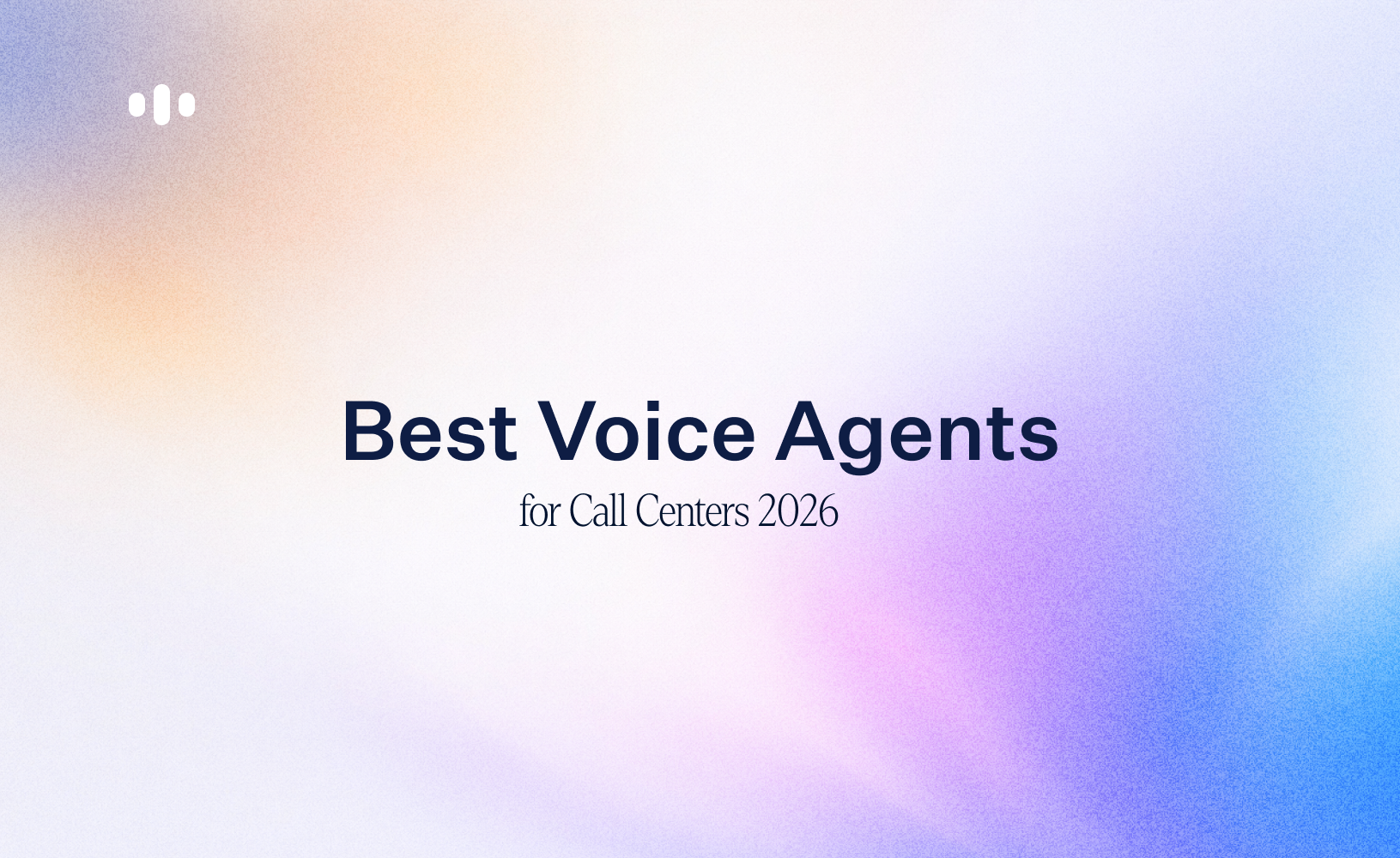Replicant helped put autonomous voice on the enterprise map. Its “Thinking Machine” markets near-human calls, multi-intent handling, and sub-second responses, which is why you’ll see it in serious contact-center conversations across regulated industries.
But the market has moved fast: newer voice-first stacks are built specifically for businesses aiming to optimize cost, speed, or integration flexibility. Modular pricing and hybrid no-code + API workflows now make it easier to pilot in days, forecast costs, and keep tight control over latency and integrations.
In this article, we’ll walk you through the best Replicant alternatives, and the trade-offs to watch as you evaluate what’s right for your team.
What Is Replicant?
Replicant is an enterprise conversational AI platform designed to automate customer service over voice and digital channels. Its flagship “Thinking Machine” aims to resolve Tier-1 requests end-to-end, handling multiple intents and responding quickly to keep calls flowing naturally.
The platform wraps automation with conversation intelligence (QA/insights) and an implementation model geared to larger contact centers. Replicant's AI offers advanced automation and conversation intelligence tailored to enterprise business logic, ensuring that AI-generated responses align with organizational workflows and policies.
In Replicant’s own framing, the system can answer in under a second and is delivered as a full-service partnership that includes delivery support and model updates.
Why Teams Look Beyond Replicant
Here’s a breakdown of Replicant’s main limitations, key areas where it may fall short for B2B buyers evaluating voice AI at scale:
- Public pricing is limited: Replicant doesn’t publish plan details or per-minute rates; most buyers go through sales, which can make forecasting harder for teams that prefer usage-based transparency. The lack of flat rate pricing and the potential for hidden fees can make budgeting difficult, especially for organizations with fluctuating call volumes.
- Vendor-led deployment model: Replicant emphasizes a full-service partnership (delivery support, ongoing model updates). That’s great for white-glove rollouts, but teams who want highly self-serve pilots and DIY iteration may prefer platforms with a builder-first approach. Replicant's vendor-led model may not suit non technical teams who need intuitive, no-code solutions for quick implementation.
- Time-to-value measured in weeks: Third-party listings describe implementations in “weeks.” If you need to stand up experiments in hours or a weekend, this cadence can feel slow compared with lighter, voice-first stacks. Technical teams seeking more control or requiring technical expertise may find Replicant's deployment model restrictive for advanced customization or integration.
- Enterprise fit first: Replicant positions as an all-in-one contact-center solution (automation + intelligence). If your priority is fine-grained developer control over telephony/LLMs and a modular toolchain, you may find more flexibility in API-centric competitors. Replicant's enterprise focus can result in limited customization, and pricing is often based on call volume, which may not suit all organizations or support center needs.
Top Replicant Alternatives in 2025
1. Retell AI
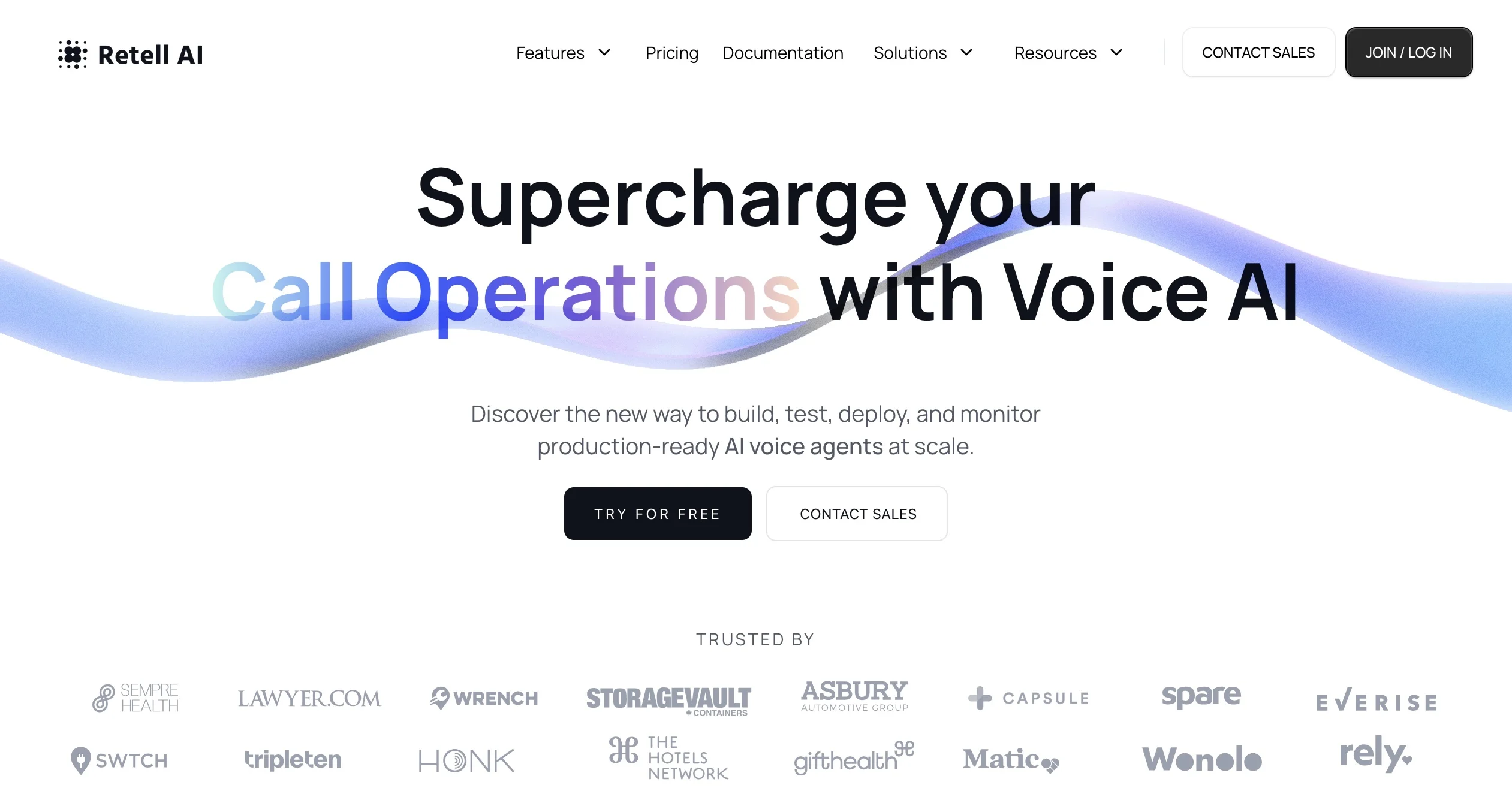
Retell AI is one of the top alternatives to Replicant, and is considered among the leading platforms for building AI voice agents. Exploring these options can help you find the best fit for your needs, whether you prioritize advanced features, performance, or the cheapest solution for specific use cases.
Replicant offers strong automation, but Retell stands out for its real-time voice performance and flexible setup. With sub-second latency, transparent pay-as-you-go pricing, and native CRM integrations, Retell makes it easy to launch and scale voice agents including as an AI answering service that resolves routine inquiries without manual support — without heavy infrastructure or long onboarding cycles.
It offers a developer-friendly platform with a drag-and-drop interface for quickly building, deploying, and monitoring AI voice agents. It supports advanced LLMs, multilingual voice models, real-time workflows, and integrations with telephony providers like Twilio.
These features can help expand your reach by supporting multiple languages and broader user engagement.
For a clear overview, see the table below summarizing key features and use cases of each alternative, including cost-effective options and their benefits. Retell also includes pre-built templates for common use cases like lead qualification, AI appointment setter flows, and customer support.
Advantages Compared to Replicant
Retell AI excels in areas like low-code infrastructure, rapid deployment, and easy integration, making it stand out for teams looking to quickly implement voice AI solutions.
- Transparent, pay-as-you-go pricing: Start instantly, pay only for usage (≈ $0.07+/minute for voice agents), no opaque enterprise package required.
- Self-serve deployment model: You can spin up agents and test without relying on full vendor-led deployment cycles.
- Hybrid API + no-code flexibility: Combines code-level control for engineers and technical teams with simpler configurability for non technical teams, making the platform accessible to a wide range of users.
- Low latency and streaming voice support: Optimized for real-time interactions and interruption handling to make conversations more natural, ensuring high call quality that directly benefits customer satisfaction.
- Custom voice + voice cloning options: You can add custom voices (up to 100 per account) or voice clones via integrations.
- LLM–agnostic & model flexibility: Use GPT-4, Claude, or your own models, and chain prompts or switch engines as needed.
- Built-in compliance posture: Supports SOC 2, HIPAA, GDPR for regulated use cases (i.e. healthcare, finance) out of the box.
- Seamless integrations & MCP server for multichannel connection: Enables voice agents to tie into existing AI assistants (ChatGPT, Claude) and orchestrate calls within your stack, with real time CRM updates to keep customer data synchronized and improve responsiveness.
- Multilingual voice models: Support for multiple languages and accents enables engagement with diverse customer bases, ensuring personalized and inclusive interactions.
- Rapid scaling & reliability: Designed for high concurrency and enterprise uptime (99.99%) so you can handle high call volumes without sacrificing quality.
Pricing
Retell provides a transparent and scalable pricing model based on call volume, without flat-rate plans or a permanent free tier. The pay-as-you-go plan starts at $0.07 per minute, with volume discounts reducing rates to $0.05/min for enterprise customers.
You are charged only for connected call minutes, with no billing for idle time. The base price covers Retell’s core voice AI services, while additional costs account for telephony and advanced large language models.
This structure ensures predictable spending with no hidden fees, allowing businesses to scale seamlessly with their support center activity and call volume. A free $10 credit and limited concurrent calls are included for testing.
Number rental is only $2 per month, and toll-free numbers are only $5 per month.
G2 Rating: 4.8/5 (612 reviews)
Review: “Retell AI has completely transformed the way we manage automated calls, with impressive voice quality and understanding”.
Recommended for:
Product teams and enterprises, as well as businesses aiming to automate customer interactions and scale efficiently, seeking a scalable, flexible voice AI platform that can be tailored to specific business needs, with transparent pricing, especially those focused on call center and outbound sales automation.
Build your first Retell agent in minutes for free.
2. Synthflow
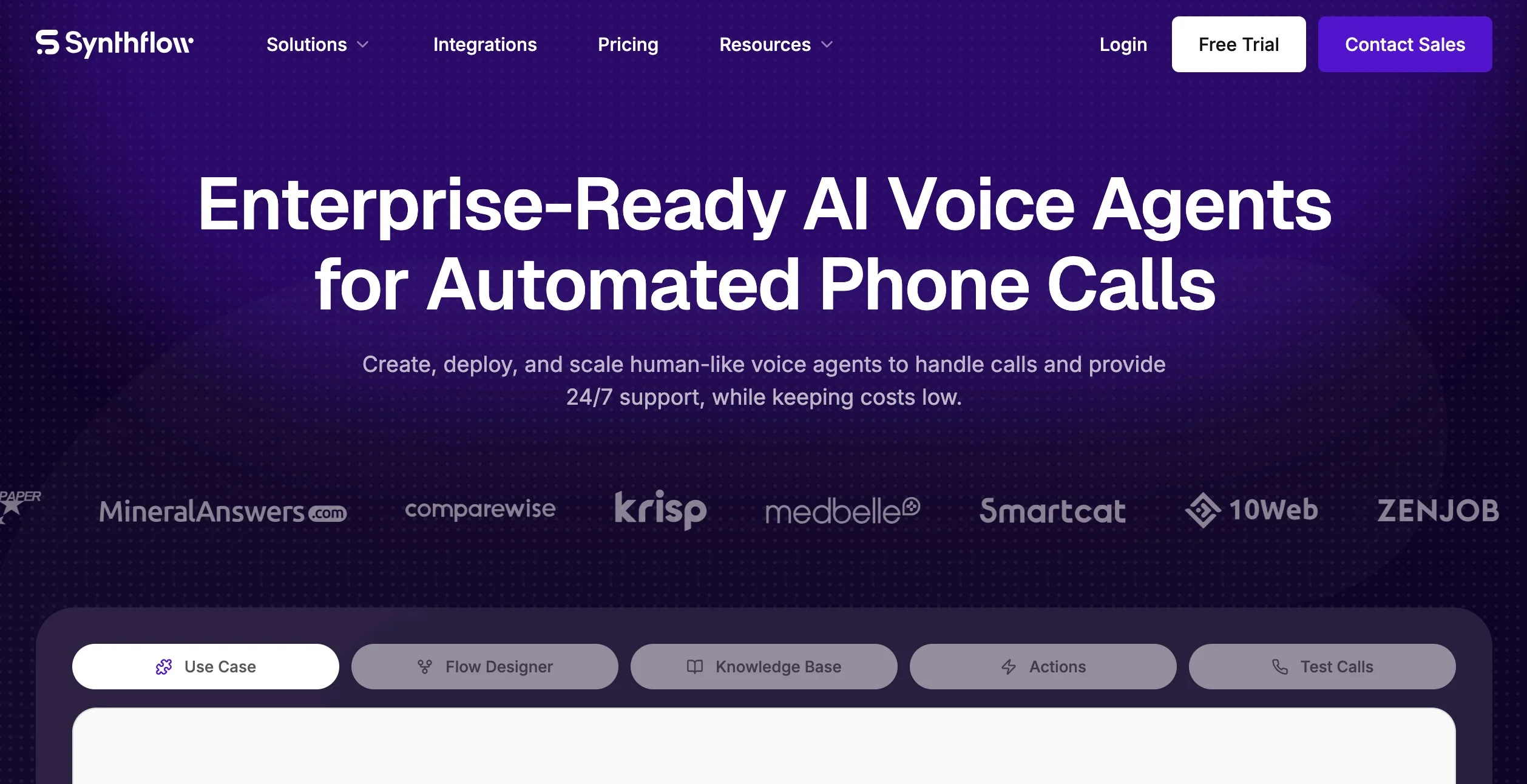
Synthflow is a scalable voice AI with a no-code visual workflow builder, real-time personalization, and deep CRM integrations, perfect for automating workflows like an AI appointment setter or outbound calling assistant.
Supports HIPAA compliance, inbound routing, and multi-tenant management for agencies. Designed for production-grade voice automation.
Advantages Compared to Replicant
- Faster setup and iteration: Synthflow’s no-code, drag-and-drop builder features an intuitive interface designed for non technical teams, enabling them to launch voice agents in hours instead of waiting for vendor-led onboarding cycles like Replicant’s.
- Transparent, self-serve pricing: Unlike Replicant’s enterprise-only contracts, Synthflow publishes clear plan tiers and per-minute rates, making budgeting and scaling predictable.
- Flexible voice customization: Through integrations with ElevenLabs and other providers, Synthflow supports natural voice cloning and tone control, giving teams more freedom over brand sound.
- Lower latency conversations: Synthflow advertises sub-500 ms response times for smoother real-time dialogue, while Replicant’s average latency is often higher due to heavier orchestration.
- Easier integrations with existing tools: Native connectors for CRMs, calendars, telephony APIs, and messaging apps allow non-technical users to automate workflows without custom engineering effort.
Pricing
Synthflow offers clear pricing tiers designed for different business needs, including a free tier for small teams. All plans are transparent, with no hidden fees, making it easy for businesses to budget effectively. The starter plan is one of the cheapest options for entry-level users, starting at $29/month for 5,000 minutes and 1 agent. The Growth plan at $99/month includes 20,000 minutes and unlimited agents. The Scale plan at $249/month supports 60,000 minutes. Custom enterprise pricing is also available.
G2 Rating: 4.5/5 (815 reviews)
Review: “What I like best about Synthflow is that it doesn’t bury you in technical complexity. You don’t need to be a coder or spend weeks wiring together APIs just to get a usable AI voice agent”.
Recommended for
Marketing teams and enterprises with specific business needs in compliance and automation, as well as those requiring robust inbound support automation and deep integrations.
Synthflow is a scalable voice AI with a no-code visual workflow builder, real-time personalization, and deep CRM integrations. Supports HIPAA compliance, inbound routing, and multi-tenant management for agencies. Designed for production-grade voice automation.
3. PolyAI

PolyAI specializes in multilingual customer support and call deflection. Integrates with major CRMs and contact center systems, and provides advanced voice customization, deep analytics, and rapid deployment.
Advantages Compared to Replicant
- Better NLU & conversational understanding: Users consistently rate PolyAI’s natural language understanding higher, and it handles dialects, interruptions, and context switching more gracefully.
- Zero wait times / instant call answering: PolyAI emphasizes “no wait time” out of the box, every incoming call is answered immediately, without IVR hold.
- Domain-aware speech recognition mid-conversation: Its speech model can switch vocabularies mid-call (e.g. UK postal codes to U.S. SSNs) dynamically, improving accuracy in multi-domain conversations.
- Robust multilingual & accent support: Built for global deployment, PolyAI handles multiple languages, accents, and dialects with consistency, making it ideal for serving diverse customer bases.
- Strong analytics & conversational insights: PolyAI offers real-time dashboards, transparency into conversation flows, and auditability to ensure alignment with brand guidelines and operational policies. It also includes sentiment analysis to detect customer emotions, such as frustration, enabling improved service and timely escalation when needed.
Pricing
PolyAI's pricing is based on call volume and does not offer flat rate pricing or public pricing tiers. Custom pricing with high entry thresholds (starting near $150K/year). Pricing is usage-based but not publicly disclosed.
G2 Rating: 5/5 (11 reviews)
Review: “There are many options for AI currently in the market. PolyAI impressed us by providing a product that could be launched in a short amount of time without risking quality”.
Recommended for:
Large enterprises and contact centers needing fully managed, custom voice AI solutions with top-tier language capabilities.
4. Bland
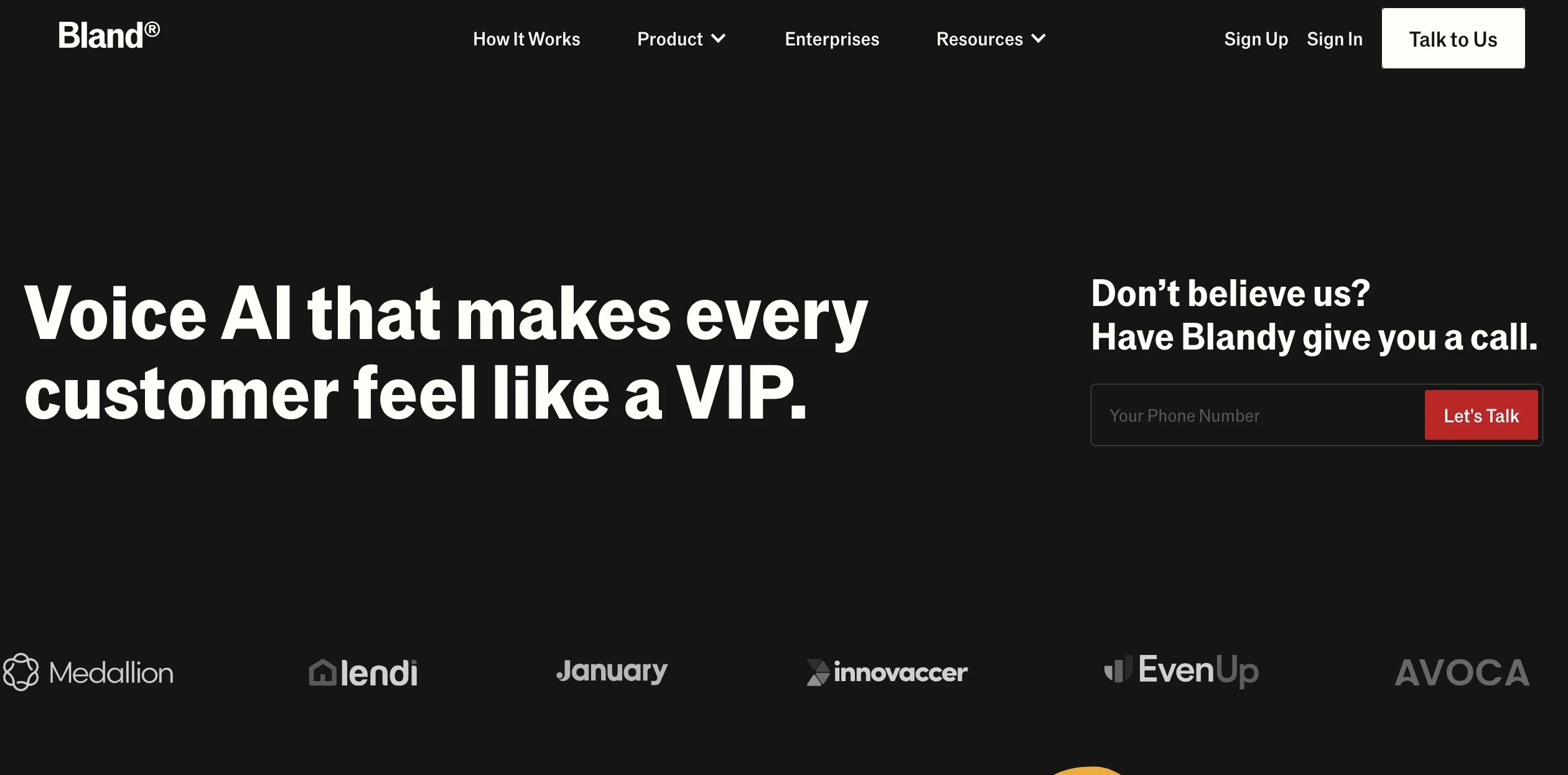
Bland emphasizes hyper-realistic voice experiences with strong security and data governance. It supports high-volume inbound and outbound calling, SMS, and omnichannel workflows, making it ideal for large-scale AI telemarketing operations and enterprise call automation.
Bland markets itself as capable of scaling up to one million concurrent calls, making it attractive to enterprises that demand resiliency.
Advantages Compared to Replicant
- Full control over conversational pathways: Bland’s Conversational Pathways let you explicitly dictate how the agent behaves at certain junctures (tone, prompts, branching logic) versus more opaque flow control in Replicant.
- Self-hosted models for lower latency: Bland stresses that it builds and self-hosts its own models rather than relying exclusively on third-party foundational models, which helps reduce latency issues and gives more control over behavior.
- Scalable concurrency: Bland claims support for up to 1 million concurrent calls, multi-region deployment, and multi-lingual support, which can help in global, high-volume use cases and effectively manage high call volumes.
- Built-in omnichannel support: Bland offers a unified stack for voice, SMS, and chat agents, so you can reuse logic across channels more easily.
- Rich integrations and memory features: Bland recently launched features like Memory, Slack & HubSpot integrations, and advanced APIs for context and analytics, helping agents maintain state across sessions.
- Privacy and governance: Bland offers strong access controls and compliance features to protect sensitive data, making it suitable for industries with strict privacy and regulatory requirements.
Pricing
No public pricing. Bland does not publish pricing tiers or offer flat rate pricing, and costs may vary depending on call volume. Buyers should inquire directly about potential hidden fees to ensure pricing transparency. Bland generally positions itself at the enterprise tier, with costs reflecting its scale and customization focus.
Product Hunt Rating: 3/5 (10 reviews)
Best for:
Large enterprises with strict requirements for privacy, governance, and brand voice customization at scale.
5. Ada.cx
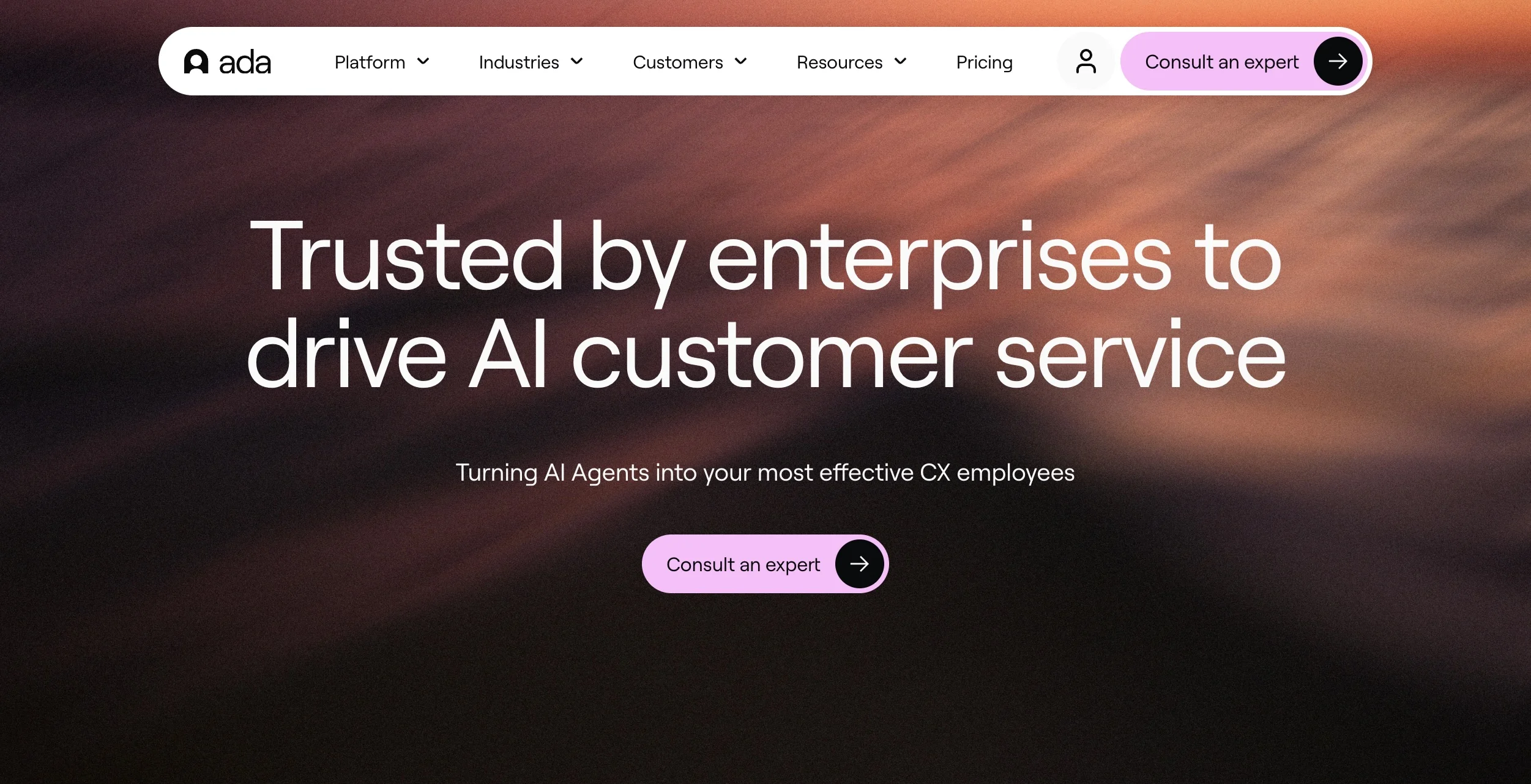
Ada.cx powers AI agents that automate customer service across chat, voice, and email, helping support teams handle complex requests at scale.
Unlike traditional bots that rely on rigid scripts, Ada’s platform was built “AI-first”, meaning its agents can understand intent, trigger workflows, and even escalate to humans when needed, all while maintaining a consistent brand tone.
Advantages compared to Replicant
- Instant voice answering: Ada Voice answers calls immediately (no wait times or separations), improving customer experience vs. systems that route through IVR first by leveraging natural language processing to understand and resolve customer inquiries autonomously.
- Omnichannel coherence: Ada lets you reuse flows and logic across channels, so voice doesn’t live in isolation.
- Faster voice deployment from existing messaging flows: If you already have Ada messaging flows, you can adapt them to voice in hours rather than building from scratch.
- Global language & dialect support: Ada supports 50+ languages in voice + messaging, helping scale to international user bases.
- Continuous learning, coaching & transparency: Ada emphasizes coaching tools, conversational insights, and feedback loops to improve its AI over time, enhancing accuracy and reducing drift.
- Seamless escalation for complex issues: When human intervention is required, Ada can escalate complex issues to human agents, ensuring a smooth handoff and improving customer satisfaction.
G2 Rating: 4.6/5 (155 reviews)
Review: “Ada helped our small support team contain the most easy-to-resolve customer inquiries, freeing-up more time for agents to go through our backlog.”
Pricing
Ada does not offer a free tier or flat rate pricing. Instead, Ada uses a performance-based pricing model with custom pricing tiers for enterprises, where companies pay based on call volume and interaction volume. Pricing is determined based on call volume, the number of monthly conversations, integrations, and deployment channels, with most enterprise plans starting in the low six figures annually.
Recommended for:
Brands that prioritize customer experience at scale, especially e-commerce, fintech, and telecom companies, where multilingual support and fast automation setup are key.
6. Sierra

Sierra AI deploys advanced AI agents for customer service that are uniquely trained to align with a company's specific brand identity.
These agents can reason, predict, and take action not just based on a knowledge base, but also by adhering to the company’s tone, values, and policies for a highly personalized interaction.
Advantages compared to Replicant
- Lifelike conversational voice: Sierra emphasizes natural speech, concise delivery, and the ability to manage interruptions or gaps, no lag or jitter.
- Omnichannel from the ground up: Sierra agents aren’t limited to voice, they work across chat, email, SMS, and messaging, with a single “build once, run everywhere” model.
- Action-enabled agents (not just Q&A): Sierra’s agents can interface with back-end systems to perform tasks (e.g. update CRM records, manage orders) rather than just answer queries.
- Strong trust, governance, and data controls: Sierra claims it doesn’t use customer data to train general models, supports PII masking, deterministic access controls, audit trails, and guardrail constraints. Sierra also provides robust compliance features to help organizations meet industry regulations and protect sensitive data.
- Brand alignment, policy, and guardrail flexibility: Their “Agent OS” architecture gives you tools to encode brand tone, policies, goals, and constraints so the agent acts in line with your values. Sierra allows customization of business logic to enforce company policies and workflow requirements.
G2 Rating: 4.3/5 (12 reviews)
Review: “User friendly, fast and many supported languages. Very complex setup process and more bugs then competitors”.
Pricing
Sierra’s pricing begins at approximately $150,000 annually, making it a more cost-effective alternative for sophisticated AI.
Unlike some competitors, Sierra does not offer public pricing tiers or flat rate pricing. Instead, final pricing is customized based on agent complexity and expected call volume. This approach ensures that costs are tailored to your support center’s needs and are based on call volume, providing a lower total cost of ownership compared to Kore.ai while delivering powerful, brand-aligned automation.
Recommended for:
Sierra is ideal for organizations serving diverse customer bases, where a consistent voice and adherence to company policy are critical, especially in telecommunications and financial services managing diverse customer segments.
7. Cognigy
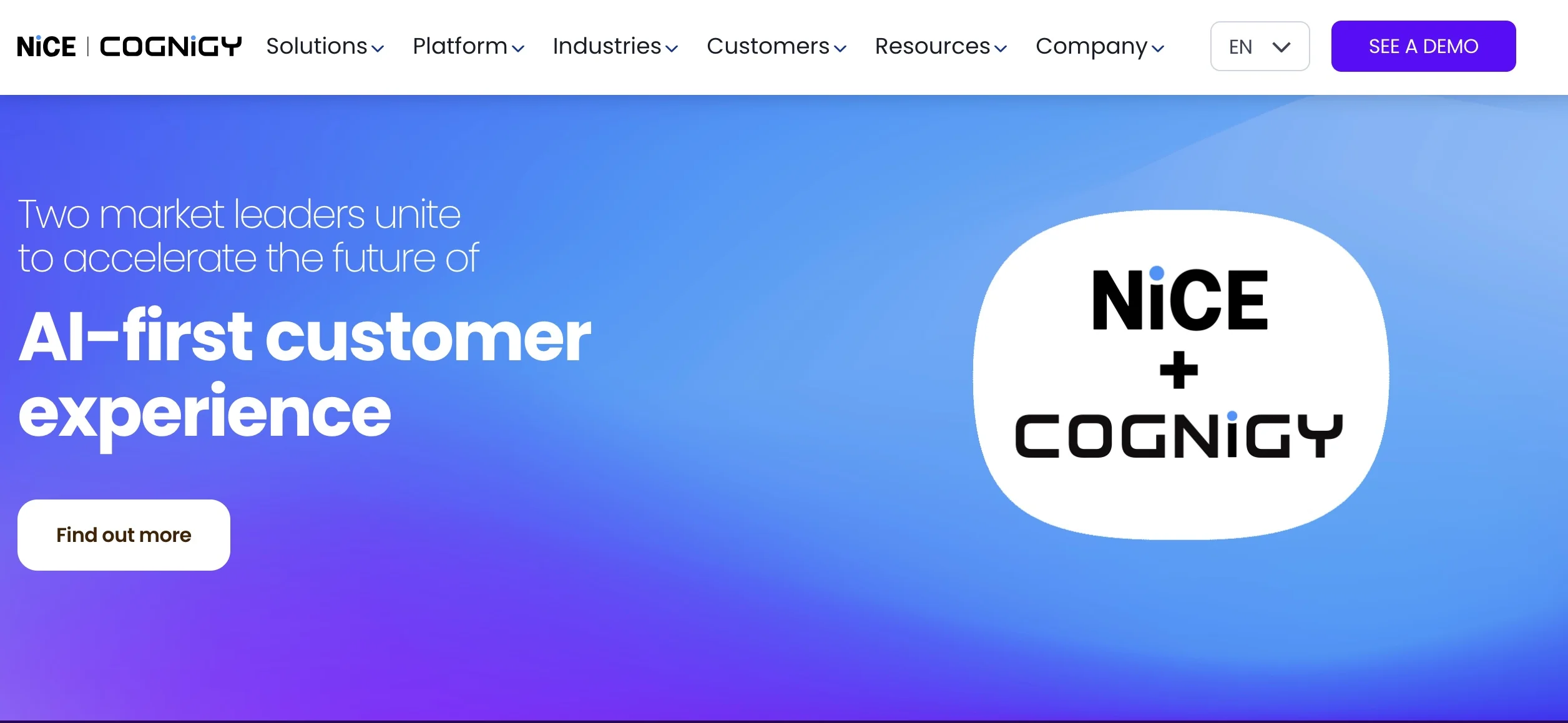
Cognigy is a conversational automation platform built for complex, enterprise-grade deployments.
It supports voice and chat channels, advanced orchestration, multilingual interactions, and customizable workflows, making it a flexible option for multinational organizations.
Advantages Compared to Replicant
- Enterprise-grade orchestration: Cognigy’s platform includes deep tooling around AI Ops, dashboards, audit trails, and orchestration logic that let you monitor, tweak, and scale complex agent behavior. It supports integration with multiple AI models and provides advanced performance metrics for real-time insights and optimization.
- Low-code + developer extension flexibility: The architecture supports drag-and-drop nodes for business users, while engineers can inject custom logic (JavaScript nodes, APIs) to adapt behavior deeply, including extensive customization of business logic.
- Multichannel & omnichannel coverage: Cognigy is built to run agents across voice, chat, web, social, giving you a unified automation layer rather than voice in isolation.
- Scalable and enterprise-proven deployment: Cognigy supports enterprise-scale volumes, compliance, and robustness (GDPR, security, high availability) that many organizations trust.
- Agent Assist and wrap-up automation: Beyond fully autonomous voice, Cognigy adds features like call summaries, agent assist mid-call, and elimination of after-call work to boost human + AI hybrid efficiency
Pricing
Enterprise licensing is typically customized to deployment scale and channel usage, with Cognigy offering custom pricing based on call volume. Pricing is not publicly listed, and there are no standard pricing tiers or flat rate pricing options available.
G2 Rating: 4.6/5 (13 reviews)
Review: “Overall I loved it but I must mention that it does not support an extensive workflow”.
Recommended For:
Global enterprises with complex workflows, multiple channels, and a need for deep orchestration across languages and regions.
8. Decagon.ai
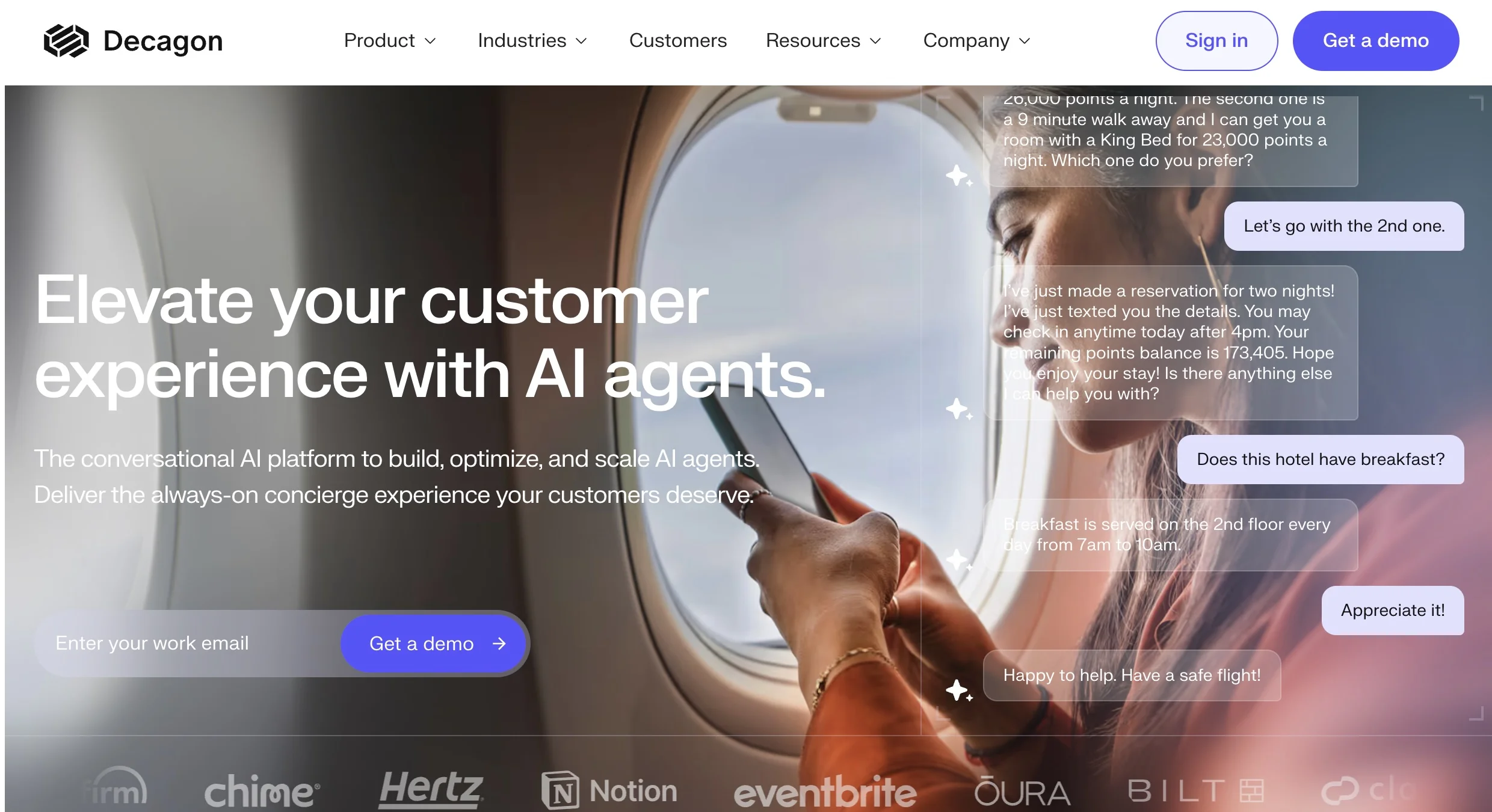
Decagon.ai offers a unified AI engine that auto-resolves customer issues across chat, voice, email, SMS, and custom channels in any language.
Their approach centers on Agent Operating Procedures (AOPs): natural-language instructions that compile into logic, allowing teams to tweak behavior without heavy coding.
Advantages Compared to Replicant
- Real-time conversational voice: Decagon advertises “fast, natural conversations” that support interruptions, intent shifts mid-dialogue, and smooth agent escalation. Decagon can escalate complex issues to human agents when human intervention is needed, ensuring effective resolution for challenging customer interactions.
- Unified cross-channel memory: Decagon preserves context across voice, chat, SMS, and email so conversations feel seamless across modalities.
- Customizable voice profiles: You can adjust voice style, tone, speed, and pronunciation to reflect your brand’s personality, critical for voice agent adoption.
- Agent Operating Procedures (AOPs) for flexible logic: Decagon’s AOP framework lets teams define behaviors in natural language which compile into workflow logic, leveraging natural language processing to interpret and execute business logic, giving flexibility without heavy engineering overhead.
- Strong analytics & visibility: Built-in dashboards automatically categorize conversations, detect trends, and suggest KB updates or retraining areas. Decagon includes sentiment analysis to detect customer emotions, helping identify frustration and improve service quality.
- Seamless integrations: Decagon supports real time CRM updates, ensuring immediate synchronization with customer data systems for enhanced responsiveness.
Pricing
Decagon does not offer a free tier or flat rate pricing. Instead, their pricing is based on call volume and the complexity of interactions, with custom pricing tiers tailored to enterprise needs. Their two main tiers are:
- Per-conversation pricing: You pay a flat fee per interaction (whether fully resolved or not). This is the more commonly chosen model among their customers.
- Per-resolution pricing: You only pay when the AI fully resolves a query without escalation. No cost for conversations that require human handoff.
Because Decagon is aimed at enterprise clients with large call volumes, their base pricing is custom and determined based on call volume and integration requirements. In one public review, estimated ranges span $95,000 to $590,900+ per year, depending on complexity, call volume, and integrations.
G2 Rating: 4.9/5 (18 reviews)
Review: “The biggest upside of using Decagon isn’t simply the assumption of repetitive day-to-day tasks that would normally be done manually, but that Decagon allows us to evaluate data on a much deeper level.”
Recommended for:
Organizations that demand high customization, transparency, and outcome-driven automation, especially in sectors like fintech, telecom, or SaaS with large support loads.
9. Voiceflow
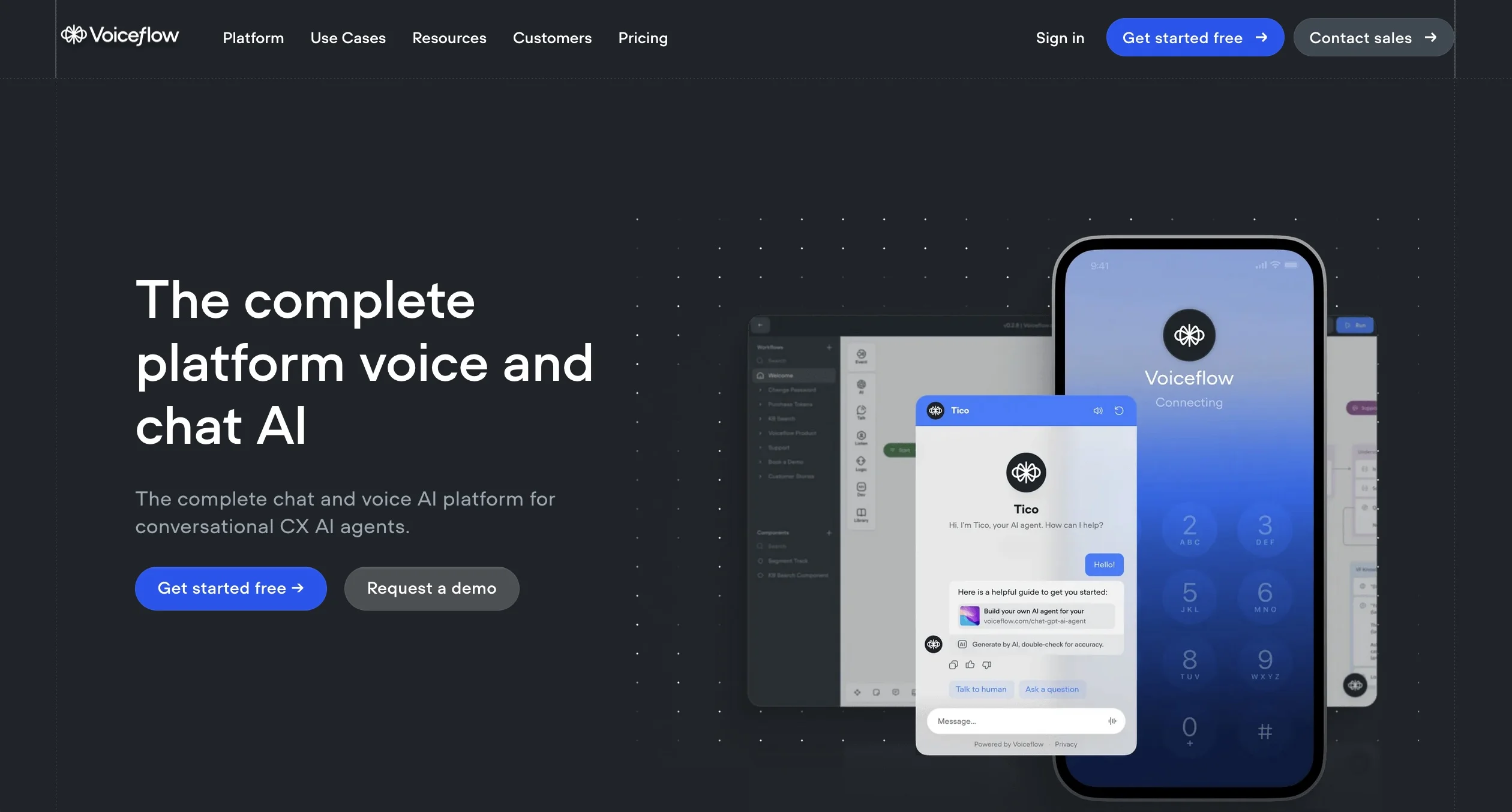
Voiceflow is a leading no-code platform for designing conversational workflows across both voice and chat.
It excels in prototyping and collaboration, allowing teams to co-design flows, manage knowledge bases, and test experiences before launch.
Advantages Compared to Replicant
- Flexible multi-LLM support: Voiceflow lets you plug in any AI model (OpenAI, Anthropic, etc.) and swap components as needed, rather than locking into a fixed “thinking machine” model.
- Drag-and-drop / no-code flow builder: Teams can visually design conversational flows using an intuitive interface that is especially suitable for non technical teams. When needed, you can augment with code or API steps, making it great for hybrid dev + non-dev workflows.
- Collaboration, permissioning & governance built in: Voiceflow supports real-time collaboration across teams, role permissions, versioning, and shared components, useful for scaling distributed orgs.
- Knowledge base & content management: You can centralize data sources, embed documents, and manage agent knowledge in one system, making your AI responses more consistent and maintainable.
- Faster prototyping and iteration: Because you can build, test, and iterate within Voiceflow’s UI (with live previews), you can validate voice + chat flows more rapidly than in heavier, vendor-led platforms.
- Omnichannel support: Voiceflow enables seamless customer interactions across various digital platforms, including messaging apps, to provide a unified and improved customer experience.
Pricing
Voiceflow offers a free tier for basic usage and provides clear pricing tiers with no hidden fees, ensuring transparency and predictable costs. The Pro plan starts at $60 per editor/month for up to 20 agents, while the Business plan at $150 per editor/month supports unlimited agents. Enterprise pricing is available on request. Voiceflow does not offer flat rate pricing, so costs may increase with higher call volume.
G2 Rating: 4.6/5 (58 reviews)
Review: “Good platform if you have less than 5,000 chats per month, otherwise extremely expensive”.
Best for:
Startups, design teams, and innovators building prototypes or multichannel bots where iteration speed is more important than call concurrency.
10. ElevenLabs
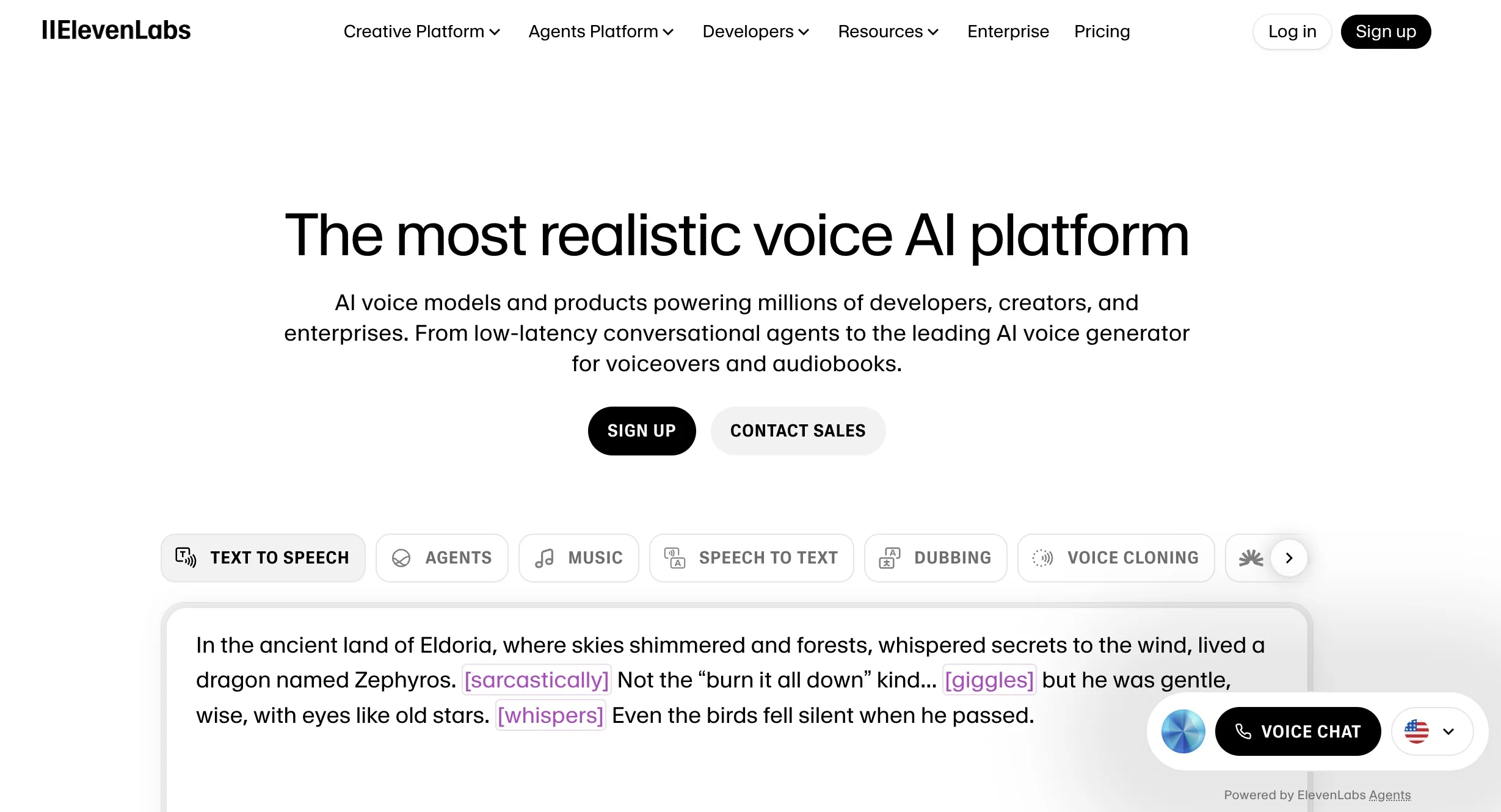
ElevenLabs is best known for its world-class text-to-speech and voice cloning tech, and more recently it’s expanded into conversational AI agents. Their platform can take user input (voice or text), ground it in your data, and produce natural spoken replies.
It’s not yet a full-blown telephony agent system, but it bridges content and voice interaction nicely, especially for brands already working in audio, narration, or voice experiences.
Advantages compared to Replicant
- High expressiveness & emotional nuance: Its “v3” voice model supports emotional depth, control over pacing, intonation, and subtle delivery, which helps the voice feel more human and dynamic. ElevenLabs also delivers exceptional call quality, enhancing customer satisfaction by ensuring clear, natural, and professional communication.
- Rich voice design and cloning tools: You can design new voices from attributes (accent, age, tone) or clone voices from minutes of reference audio, giving you brand-aligned or unique voices that feel custom.
- Multilingual support at scale: It supports 70+ languages in its speech generation, making it suitable for organizations serving diverse customer bases. This enables effective engagement with customers from different backgrounds for global deployments without needing separate models per locale.
Pricing
ElevenLabs offers a free tier and several pricing tiers, allowing users to choose a plan that fits their needs. There is no flat rate pricing; instead, costs are based on call volume and usage, which helps ensure transparent and predictable pricing without hidden fees.
Example tiers (as of now):
- Free: 10,000 credits / month (≈10 minutes of high-quality TTS or 15 minutes of agent use)
- Starter: $5/month for 30,000 credits
- Creator / Pro / Business / Enterprise: stepping up to 100k, 500k, millions of credits with higher-quality audio, API priority, SLA, etc.
Because it’s usage-based, your total cost will depend heavily on your call volume, how many agent minutes you use, how much audio you generate, and how premium the voices are.
Recommended for:
If your product or brand already has a voice or audio focus (podcasts, narration, gaming, or voice apps) and you want to layer in conversational agents, ElevenLabs is a powerful pick. It’s especially strong when you care deeply about sound quality, expressiveness, and voice branding. But if your priority is full telephony integration, call switching, deep voice workflows, or super predictable pricing, Replicant (or others) might still lead in those domains.
What Replicant’s Alternatives Get Right
The landscape of conversational voice AI keeps evolving fast, and Replicant, while still a recognized name in autonomous contact center automation, now faces a new generation of challengers built for speed, transparency, and flexibility.
Platforms like Retell AI deliver sub-second latency, modular APIs, and pay-as-you-go pricing that make experimentation effortless. Synthflow and Voiceflow simplify design and iteration, while PolyAI, Sierra, and Cognigy push naturalness and reasoning to new levels for enterprise teams.
Others, like Decagon.ai, Bland, and ElevenLabs, expand what’s possible with real-time voice, scaling, and expressive AI.
Each solution has its angle, but if your goal is to deploy truly human-sounding voice agents (from AI receptionists to sales or support automation) that you can build, test, and scale on your own terms, Retell AI stands out as one of the most compelling Replicant alternatives in 2025.
See how much your business could save by switching to AI-powered voice agents.
Your submission has been sent to your email
ROI Result
Total Human Agent Cost
AI Agent Cost
Estimated Savings
A Demo Phone Number From Retell Clinic Office
